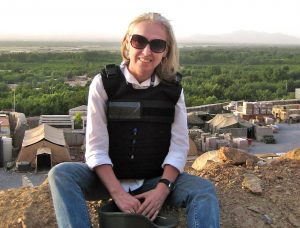Veteran Australian war correspondent Lynne O’Donnell has returned to Afghanistan to cover the withdrawal of U.S. and allied forces, two decades after the troubled country was invaded following the al-Qaida attacks on New York and Washington, D.C.
The Taliban and the government of Ashraf Ghani are positioning themselves for renewed struggle, and O’Donnell says Afghans are worried about their future amid a sharply reduced U.S. military presence.
Between 2009 and 2017, O’Donnell was bureau chief in Kabul for The Associated Press and the French news agency AFP. She now writes for a wide range of publications, including Foreign Policy, Tortoise Media, and the South China Morning Post.
She holds an MA in War Studies from King’s College London, where she is a research fellow of the war studies department and a visiting research fellow at the Institute of Psychiatry, Psychology & Neuroscience.
Her first book, “High Tea in Mosul: The True Story of Two Englishwomen in War-torn Iraq,” was published in 2007, and her next book, “From the Frontline: Women Reporting War 1899-2020” will be published in late 2022.
O’Donnell spoke with The Diplomat’s Luke Hunt about the U.S. withdrawal, the threats posed by sectarian violence, and the terrorist groups that continue to undermine peace and security within the region.
Luke Hunt can be followed on Twitter @lukeanthonyhunt

































